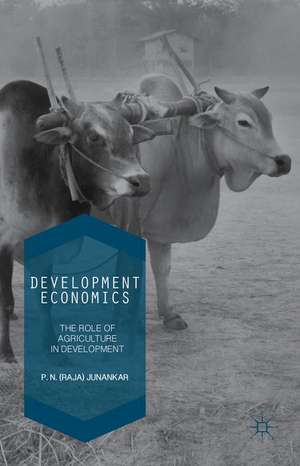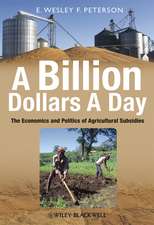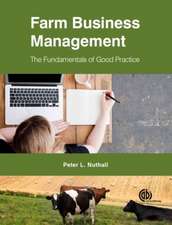Development Economics: The Role of Agriculture in Development
Editat de P. N. (Raja) Junankaren Limba Engleză Hardback – 14 mar 2016
Preț: 640.88 lei
Preț vechi: 753.97 lei
-15% Nou
Puncte Express: 961
Preț estimativ în valută:
122.63€ • 128.38$ • 101.47£
122.63€ • 128.38$ • 101.47£
Carte tipărită la comandă
Livrare economică 05-19 aprilie
Preluare comenzi: 021 569.72.76
Specificații
ISBN-13: 9781137555212
ISBN-10: 1137555211
Pagini: 233
Ilustrații: XII, 233 p.
Dimensiuni: 140 x 216 x 16 mm
Greutate: 0.43 kg
Ediția:1st ed. 2016
Editura: Palgrave Macmillan UK
Colecția Palgrave Macmillan
Locul publicării:London, United Kingdom
ISBN-10: 1137555211
Pagini: 233
Ilustrații: XII, 233 p.
Dimensiuni: 140 x 216 x 16 mm
Greutate: 0.43 kg
Ediția:1st ed. 2016
Editura: Palgrave Macmillan UK
Colecția Palgrave Macmillan
Locul publicării:London, United Kingdom
Cuprins
1. Introduction
2. Land Tenure, Agricultural Productivity, and Taxation
2.1 Land Tenure and Indian Agricultural Productivity
2.2 Land Ceilings as a Tax on Agriculture
2.3 Review of Palanpur: The Economy of an Indian Village
2.4 Agricultural Taxation in Less Developed Countries
3 Poverty, Mobility and Inequality
3.1 Poverty in India
3.2 The Green Revolution and Inequality
3.3 Mobility and Inequality in Indian Agriculture
4 Do Farmers in Developing Countries Maximise Profits?
4.1 Tests of the Profit Maximisation Hypothesis
4.2 Do Indian Farmers Maximize Profits?
4.3 Neoclassical Economics and Indian Agriculture
4.4 The Response of Peasant Farmers to Price Incentives
5 Informal Labour Markets
5.1 The Informal Labour Market in India
6 Microfinance and Women's Empowerment
6.1 Factors influencing women's empowerment on microcredit borrowers
2. Land Tenure, Agricultural Productivity, and Taxation
2.1 Land Tenure and Indian Agricultural Productivity
2.2 Land Ceilings as a Tax on Agriculture
2.3 Review of Palanpur: The Economy of an Indian Village
2.4 Agricultural Taxation in Less Developed Countries
3 Poverty, Mobility and Inequality
3.1 Poverty in India
3.2 The Green Revolution and Inequality
3.3 Mobility and Inequality in Indian Agriculture
4 Do Farmers in Developing Countries Maximise Profits?
4.1 Tests of the Profit Maximisation Hypothesis
4.2 Do Indian Farmers Maximize Profits?
4.3 Neoclassical Economics and Indian Agriculture
4.4 The Response of Peasant Farmers to Price Incentives
5 Informal Labour Markets
5.1 The Informal Labour Market in India
6 Microfinance and Women's Empowerment
6.1 Factors influencing women's empowerment on microcredit borrowers
Recenzii
“Combining theoretical discussion and rich empirical analysis, this book has successfully filled a void left by existing development economics literature. The book provides readers with plenty of information regarding the role of agriculture in the process of development, which was usually omitted in previous development economics literature. … This book takes one of the most important issues with which relevant economic analysis should be welcomed. This book will gain a broad readership among economists and students in development economics.” (Jianqing Ruan, China Agricultural Economic Review, Vol. 9 (1), 2017)
Notă biografică
Raja Junankar studied at the London School of Economics, and has a Ph.D. from the University of Essex, UK. He has held research and teaching appointments in Australia, Britain, Canada, France, Germany, India, and the United States of America. He has published several books and refereed papers in leading national and international journals. He is an Emeritus Professor, University of Western Sydney and Honorary Professor, UNSW Australia.
Textul de pe ultima copertă
Informal labour markets are prevalent in developing countries and these provide poor conditions of work and living for a large majority of the population. The papers in this book study economic development from the perspective of social justice and economic efficiency; exploring the role of land tenure and productivity in Indian agriculture. Junankar discusses the efficiency of small farms versus large farms, and the role of share-cropping tenancy. He provides a critique of neoclassical economics that assumes farmers maximize profits in competitive markets and argues that social and institutional conditions limit the conditions under which farmers operate in developing countries. Development Economics raises issues of poverty, inequality and mobility of agriculturists.
Junankar proposes different taxation principles on agricultural producers that would lead to a more efficient and equitable system; and this collection of essays also highlights the role of microfinance in helping the empowerment of women in poor countries.
Junankar proposes different taxation principles on agricultural producers that would lead to a more efficient and equitable system; and this collection of essays also highlights the role of microfinance in helping the empowerment of women in poor countries.
Caracteristici
Brings together seminal papers from leading figure in development economics Proposes ways for farmers to maximise profits Analyses economic development from a social justice and economic efficiency perspective











